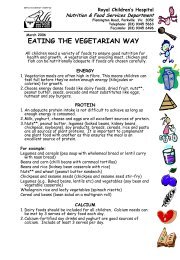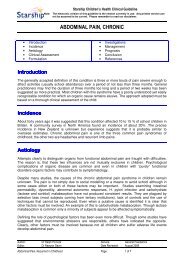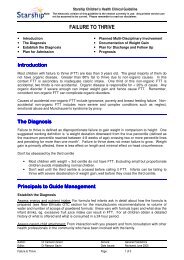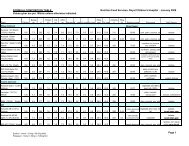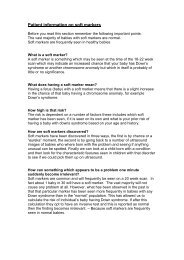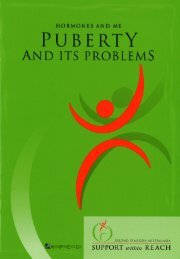- Page 1 and 2:
Infant Feeding Guidelines for Healt
- Page 3 and 4:
One of the responses of the Austral
- Page 5 and 6:
Table of Contents Introduction ....
- Page 7 and 8:
Goat’s milk .....................
- Page 9 and 10:
period of this review will generall
- Page 11 and 12:
Infant formula - Preparation, use a
- Page 13 and 14:
Protein levels of infant formula. F
- Page 15 and 16:
a. Will the use of a heavier refere
- Page 17 and 18:
Time to first feed and breastfeedin
- Page 19 and 20:
controlled for in multivariate logi
- Page 21 and 22:
the baby, or for suturing the mothe
- Page 23 and 24:
Impact of delivery method on breast
- Page 25 and 26:
Studies used to make evidence state
- Page 27 and 28:
For those who were fully breastfeed
- Page 29 and 30:
Effect on risk 0.56-0.88) Assisted
- Page 31 and 32:
significant Breastfeeding initiatio
- Page 33 and 34:
Results Adj OR never breastfed Assi
- Page 35 and 36:
Birth weight and breastfeeding If t
- Page 37 and 38:
3500-3999 vs 3000-3499 1.00 (95% CI
- Page 39 and 40:
Population/study information Perth,
- Page 41 and 42:
Any breastfeeding duration No adjOR
- Page 43 and 44:
cohort study reported no associatio
- Page 45 and 46:
Results [8] Intro of formula at 4 w
- Page 47 and 48:
Clinical 1 1 1 importance Clinical
- Page 49 and 50:
6. If mother-baby separation is una
- Page 51 and 52:
Studies reviewed to make evidence s
- Page 53 and 54:
Reference Scott JA, Binns CW, Oddy
- Page 55 and 56:
Effect on risk There was no associa
- Page 57 and 58:
Studies used to make evidence state
- Page 59 and 60:
infant Clinical 1 1 1 4 importance
- Page 61 and 62:
Reference Qiu et al Asia Pac J Clin
- Page 63 and 64:
Social support (other than fathers)
- Page 65 and 66:
pregnancy interventions on breastfe
- Page 67 and 68:
Reference Scott JA, Landers MCG, Hu
- Page 69 and 70:
weeks, 3 months & 6 months postpart
- Page 71 and 72:
Studies used to make evidence state
- Page 73 and 74:
Quality P O P Results Breastfeeding
- Page 75 and 76:
analysis analysis Effect on risk No
- Page 77 and 78:
Studies used to make evidence state
- Page 79 and 80:
Location (rural vs urban) and breas
- Page 81 and 82:
Effect on risk New Territories not
- Page 83 and 84:
Socioeconomic status Sufficient evi
- Page 85 and 86:
Quality P P O P Results Adj OR any
- Page 87 and 88:
Whether the mechanism for this asso
- Page 89 and 90:
obesity and infant feeding intentio
- Page 91 and 92:
Parity and Breastfeeding Parity has
- Page 93 and 94:
Quality P P P P Results No signific
- Page 95 and 96:
discharge. Quality P P P P Results
- Page 97 and 98:
Effect on risk There was not associ
- Page 99 and 100:
Effect on risk No effect of parity
- Page 101 and 102:
For Australian mothers 5 studies fo
- Page 103 and 104:
25-29 1.710 (1.085, 2.698) ≤24 1.
- Page 105 and 106:
30-34: 0.87 (95%CI 0.64-1.18) Adjus
- Page 107 and 108:
Clinical 1 2 1 relevance Generalisa
- Page 109 and 110:
Reference Binns CW, Gilchrist D, Gr
- Page 111 and 112:
Population/study information Infant
- Page 113 and 114:
Intervention/ comparator 40 years v
- Page 115 and 116:
Maternal education and breastfeedin
- Page 117 and 118:
Studies used to make evidence state
- Page 119 and 120:
Effect on risk Mothers who complete
- Page 121 and 122:
significant independent association
- Page 123 and 124:
Demand feeding, Rooming in and brea
- Page 125 and 126:
Effect on risk There was no signifi
- Page 127 and 128:
1991. Quality P P P P Results No sp
- Page 129 and 130:
Studies used to make evidence state
- Page 131 and 132:
Cultural differences on Exercise an
- Page 133 and 134:
During pregnancy, women should avoi
- Page 135 and 136:
findings of this study support the
- Page 137 and 138:
Studies used to make evidence state
- Page 139 and 140:
N 14 countries 3032 17 359 singleto
- Page 141 and 142:
8. Encourage breastfeeding on deman
- Page 143 and 144:
Breastfeeding and SIDS BREASTFEEDIN
- Page 145 and 146:
descriptive) RESULTS Outcome EXTERN
- Page 147 and 148:
Additional Notes 1. Clinical Eviden
- Page 149 and 150:
Use of Pacifiers for the Prevention
- Page 151 and 152:
American Academy of Pediatrics Poli
- Page 153 and 154:
Parslow et al. 2004). In addition,
- Page 155 and 156:
Studies used to make evidence state
- Page 157 and 158:
N Population/study information 570
- Page 159 and 160:
Both the Baby Friendly Hospital Ini
- Page 161 and 162:
lanolin, aerosol spray, ointment, f
- Page 163 and 164:
Incidence of nipple pain/trauma No
- Page 165 and 166:
Studies used to make evidence state
- Page 167 and 168:
Effect on risk Sore nipples, althou
- Page 169 and 170:
Systemic antibiotics are recommende
- Page 171 and 172:
Results Routine Care Versus Heat Ve
- Page 173 and 174:
anticipatory guidance with regard t
- Page 175 and 176:
In a cohort of 280 mother-infant pa
- Page 177 and 178:
months in 1987-9. Completed two wri
- Page 179 and 180:
Population/study information Sample
- Page 181 and 182:
Nipple Shield Use Search results Th
- Page 183 and 184:
Other Nipple Problems Eczema and De
- Page 185 and 186:
Raynaud’s Phenomenon of the Nippl
- Page 187 and 188:
Table. Management of breastmilk ins
- Page 189 and 190:
Effect on risk Factor analysis sugg
- Page 191 and 192:
Definition of breastfeeding Interve
- Page 193 and 194:
Reference Hurley et al. 2008 Gatti
- Page 195 and 196:
y test-weighing) Clinical 1 1 1 imp
- Page 197 and 198:
Engorgement of the Breast Search re
- Page 199 and 200:
more frequently prior to the recurr
- Page 201 and 202:
Studies used to make evidence state
- Page 203 and 204: Reference Mangesi & Dowswell 2010 C
- Page 205 and 206: Inflammatory conditions of the brea
- Page 207 and 208: Three studies reported on the occur
- Page 209 and 210: In the management of mastitis, the
- Page 211 and 212: Quality 0 0 P Results The cumulativ
- Page 213 and 214: was an intention to breastfeed. Par
- Page 215 and 216: Level of evidence I (a) I (aetiolog
- Page 217 and 218: Further adequately powered research
- Page 219 and 220: Applicability Satisfactory Results
- Page 221 and 222: Studies used to make evidence state
- Page 223 and 224: Reference Kvist et al. 2007 Kvist e
- Page 225 and 226: egarding aspiration technique Effec
- Page 227 and 228: Many epidemiological studies have d
- Page 229 and 230: normal functioning (Horowitz and Go
- Page 231 and 232: • Ask mothers if they are losing
- Page 233 and 234: Studies used to make evidence state
- Page 235 and 236: the first 3 months postpartum, with
- Page 237 and 238: Effect on risk This variability is
- Page 239 and 240: In a US study of 802 women they fou
- Page 241 and 242: Studies used to determine the risk
- Page 243 and 244: A predictive relationship was consi
- Page 245 and 246: The effect size of social support i
- Page 247 and 248: weeks of delivery Four validated se
- Page 249 and 250: growth faltering N > 22,000 929 chi
- Page 251 and 252: Breast Refusal Search results The i
- Page 253: Prevalence Rates of Excessive Cryin
- Page 257 and 258: (Dwyer and Ponsonby 2009). Medicati
- Page 259 and 260: ultrasonically. Real time ultrasoni
- Page 261 and 262: Reference Heine et al. (2006) Cheri
- Page 263 and 264: There was no significant associatio
- Page 265 and 266: positioning strategies. The treatme
- Page 267 and 268: Reference van Wijk et al. (2007) Co
- Page 269 and 270: Generalisability Y Y- Italy Y Appli
- Page 271 and 272: myenteric plexus Quality P P N Resu
- Page 273 and 274: comparator N Population/study infor
- Page 275 and 276: Effect on risk There were fewer adv
- Page 277 and 278: Component Rating Notes Evidence Bas
- Page 279 and 280: Studies used to make evidence state
- Page 281 and 282: and/or difficulty of the baby latch
- Page 283 and 284: Reference Dollberg et al. 2006 Srin
- Page 285 and 286: Effect on risk Frenotomy alleviates
- Page 287 and 288: Studies used to make the statement
- Page 289 and 290: Notes on postpartum weight loss Ip
- Page 291 and 292: Main results: Twelve studies met th
- Page 293 and 294: Storage of Expressed Breastmilk Wha
- Page 295 and 296: 4. Storage of Expressed Breastmilk
- Page 297 and 298: Expression and Breastfeeding durati
- Page 299 and 300: duration) Clinical 1 1 1 importance
- Page 301 and 302: VI Breastfeeding in specific situat
- Page 303 and 304: Mothers currently using illicit dru
- Page 305 and 306:
Summary of the evidence The effect
- Page 307 and 308:
showing a negative association with
- Page 309 and 310:
Population/study information breast
- Page 311 and 312:
Effect on risk response relationshi
- Page 313 and 314:
pregnancy Quality P P P P Results A
- Page 315 and 316:
Reference Forster DA, McLachlan HL
- Page 317 and 318:
who did not stop smoking. duration
- Page 319 and 320:
-1, 5) Not breastfeeding: 1% (95% C
- Page 321 and 322:
≥6 vs non-smoker Adj OR (95%CI) n
- Page 323 and 324:
Larger hospitals - mothers recruite
- Page 325 and 326:
The Merck Manual online version als
- Page 327 and 328:
Sufficient evidence was found to ma
- Page 329 and 330:
Does return to work negatively affe
- Page 331 and 332:
Returned to work (
- Page 333 and 334:
N [5] 2079 of 3670 questionnaires r
- Page 335 and 336:
Reference [1] Forster DA, McLachlan
- Page 337 and 338:
technical 0.32 (95%CI 0.25-0.42) Se
- Page 339 and 340:
Reference Scott JA, Aitkin I, Binns
- Page 341 and 342:
Contraception and Breastfeeding The
- Page 343 and 344:
Authors’ conclusions: Postpartum
- Page 345 and 346:
ich countries where there it is aff
- Page 347 and 348:
eview by (Bulteel and Henderson 200
- Page 349 and 350:
Galactosaemia in Infants Search res
- Page 351 and 352:
of birth. Every effort should be ma
- Page 353 and 354:
Hepatitis C and HIV co-infected mot
- Page 355 and 356:
Studies used to make evidence state
- Page 357 and 358:
significantly affect HCV transmissi
- Page 359 and 360:
The PKU handbook includes the follo
- Page 361 and 362:
Tuberculosis and Breastfeeding Sear
- Page 363 and 364:
Syphillis in Breastfeeding Mothers
- Page 365 and 366:
paediatricians (Australian College
- Page 367 and 368:
the Cochrane Central Register of Co
- Page 369 and 370:
Objectives: To determine the effect
- Page 371 and 372:
Objectives: In newborn infants with
- Page 373 and 374:
information on bottle-feeding and d
- Page 375 and 376:
Cow’s Milk Search results The ini
- Page 377 and 378:
The SLR by Wijndaele and colleagues
- Page 379 and 380:
infants were fed formula for 1 mont
- Page 381 and 382:
Studies used to make evidence state
- Page 383 and 384:
Quality 0 (No to 6.2 and 7.4 P P 0
- Page 385 and 386:
Reference Conn et al. 2009 Couper e
- Page 387 and 388:
eastfed Fe intake was inadequate fo
- Page 389 and 390:
England. After the birth, a short q
- Page 391 and 392:
food weighing (BM: n =21; BCM: n =
- Page 393 and 394:
Population/study information Sample
- Page 395 and 396:
positive stools upon cow milk feedi
- Page 397 and 398:
data were collected from the parent
- Page 399 and 400:
Applicability Y- Denmark Y - Vietna
- Page 401 and 402:
milk during infancy can result in s
- Page 403 and 404:
X Infant feeding and later Outcomes
- Page 405 and 406:
Overall quality assessment (Positiv
- Page 407 and 408:
finally recruited. Outcome measure
- Page 409 and 410:
Intervention Comparator N Populatio
- Page 411 and 412:
elevance Generalisability Y N Y App
- Page 413 and 414:
Current advice from the Australasia
- Page 415 and 416:
elevant food allergens altogether.
- Page 417 and 418:
71. However, it should be recognise
- Page 419 and 420:
Obesity and infant feeding The dura
- Page 421 and 422:
) Around six months c) Around six m
- Page 423 and 424:
The Paediatrics & Child Health Divi
- Page 425 and 426:
Belarus found that during the perio
- Page 427 and 428:
The American Academy of Pediatrics
- Page 429 and 430:
efore age 4 months was associated w
- Page 431 and 432:
isk of obesity at age 7 yrs. while
- Page 433 and 434:
Effect on risk Positive Positive Ne
- Page 435 and 436:
Results Any breastfeeding reduced t
- Page 437 and 438:
eastfeeding promotion intervention
- Page 439 and 440:
Effect on risk Negative Negative Ne
- Page 441 and 442:
Studies used to make evidence state
- Page 443 and 444:
Additional Notes Horta: Meta-analys
- Page 445 and 446:
socioeconomic status strongly influ
- Page 447 and 448:
Breastfeeding and Obesity Notes Whi
- Page 449 and 450:
Breastfeeding and Bowel Disease: Co
- Page 451 and 452:
Notes on Coeliac Disease and IBD -
- Page 453 and 454:
This paper is not directly related
- Page 455 and 456:
Table 1 Death rates from coronary a
- Page 457 and 458:
Figure 1 Hazard ratios for coronary
- Page 459 and 460:
These adaptations permanently ‘re
- Page 461 and 462:
postnatal growth—programs to avoi
- Page 463 and 464:
“Health care professional’ - a
- Page 465 and 466:
7.3. No financial or material induc
- Page 467 and 468:
Appendix 460
- Page 469 and 470:
9 FISH (S1.1) Data was extracted fr
- Page 471 and 472:
allergies. Assigned to n-3 egg, no
- Page 473 and 474:
Table 13.1 Studies used to make evi
- Page 475 and 476:
14 SUGARS (S1.1) SUGARS and DENTAL
- Page 477 and 478:
Effect on risk (Increase/None /Prot
- Page 479 and 480:
Table 18.1 Studies used to make evi
- Page 481 and 482:
Clinical importance Clinical releva
- Page 483 and 484:
Population/study information [6] Ch
- Page 485 and 486:
Table 18.2 Studies used to make evi
- Page 487 and 488:
Table 18.4 Studies used to make evi
- Page 489 and 490:
obesity (P=0.008) and 6.2-fold risk
- Page 491 and 492:
quality and were both conducted in
- Page 493 and 494:
associated with a decreased risk of
- Page 495 and 496:
The systematic review was of very p
- Page 497 and 498:
Effect on risk (0.45-76.85). (OR ra
- Page 499 and 500:
excluded. from the Denver metropoli
- Page 501 and 502:
21 DIETARY PATTERNS (U1.1) What die
- Page 503 and 504:
Applicability Excellent Studies con
- Page 505 and 506:
or Neutral) plus descriptive) RESUL
- Page 507 and 508:
Table 24.2 Summary used to make evi
- Page 509 and 510:
Statistical analysis methods Overal
- Page 511 and 512:
from 8 - 12 months (outcome three);
- Page 513 and 514:
infants with low z-scores provided
- Page 515 and 516:
Kajosaari 1983 and Oddy 1999 report
- Page 517 and 518:
of upper respiratory infectionRR 0.
- Page 519 and 520:
still be managed individually so th
- Page 521 and 522:
Length of follow-up Outcome(s) meas
- Page 523 and 524:
0.94 (95% CI 0.87 -1.01). Professio
- Page 525 and 526:
Conclusion Additional professional
- Page 527 and 528:
Outcome(s) measured INTERNAL VALIDI
- Page 529 and 530:
Conclusion PIM is one of the most c
- Page 531 and 532:
Table 24.3 Summary used to make evi
- Page 533 and 534:
BREASTFEEDING AND SUDDEN INFANT DEA
- Page 535 and 536:
RESULTS Outcome EXTERNAL VALIDITY G
- Page 537 and 538:
ALCOHOL, CAFFEINE AND BREASTFEEDING
- Page 539 and 540:
Table 26.1 Summary of studies to ma
- Page 541 and 542:
SELENIUM AND BREASTFEEDING OUTCOMES
- Page 543 and 544:
Table 26.2 Summary of studies used
- Page 545 and 546:
FACTORS ASSOCIATED WITH ENHANCED BR
- Page 547 and 548:
Total number of participants Popula
- Page 549 and 550:
weight loss).Comparison one: contro
- Page 551 and 552:
month) (outcome five). For the 8-12
- Page 553 and 554:
study also provided data on head ci
- Page 555 and 556:
found no reduction in risk of a pos
- Page 557 and 558:
espiratory tract infection RR 1.07
- Page 559 and 560:
Affiliation/so urce of funds Univer
- Page 561 and 562:
Perceived Insufficient Milk (PIM) T
- Page 563 and 564:
Overall quality assessment (Positiv
- Page 565 and 566:
professional support to be effectiv
- Page 567 and 568:
EXTERNAL VALIDITY Generalisabil ity
- Page 569 and 570:
people together was specific to bre
- Page 571 and 572:
References Abdulwadud Omar, A., & S
- Page 573 and 574:
Gatti, L. 2008, "Maternal perceptio
- Page 575 and 576:
Poole, J. A., Barriga, K., Leung, D
- Page 577 and 578:
Monitoring Breastfeeding in Austral
- Page 579 and 580:
Labiner-Wolfe, Judith, Sara B. Fein
- Page 581 and 582:
Issues in selecting a growth refere
- Page 583 and 584:
that breastfeeding, with exclusive
- Page 585 and 586:
they noted that “during the first
- Page 587 and 588:
lower percentiles (0.4 and 2 percen
- Page 589 and 590:
Breastfeeding is an integral part o
- Page 591 and 592:
Royal Australian College of General
- Page 593 and 594:
feeding, the AAP firmly adheres to
- Page 595 and 596:
If an infant is not breastfed, or i
- Page 597 and 598:
Interventions to Promote Breastfeed
- Page 599 and 600:
ethnicity or maternal age cannot be
- Page 601 and 602:
three months, interventions involvi
- Page 603 and 604:
Data Collection and Analysis: We us
- Page 605 and 606:
Major Reviews of Infant Feeding 200
- Page 607 and 608:
Proportion of adult smokers who hav
- Page 609 and 610:
figures indicate that we have littl
- Page 611 and 612:
Funding has also been allocated to
- Page 613 and 614:
National Longitudinal Survey of Chi
- Page 615 and 616:
608
- Page 617 and 618:
infectious diseases. There is a lar
- Page 619 and 620:
In Queensland, according to the 200
- Page 621 and 622:
eastfeeding at 6 months were among
- Page 623 and 624:
gestational age or who have experie
- Page 625 and 626:
Ten Steps to Successful Breastfeedi
- Page 627 and 628:
620
- Page 629 and 630:
622
- Page 631 and 632:
deficiency has also been associated
- Page 633 and 634:
PAHO Guiding Principles for Complem
- Page 635 and 636:
Breastfeeding Rates in Australia A
- Page 637 and 638:
Population/ study information A tot
- Page 639 and 640:
Population/ study information The s
- Page 641 and 642:
Type of study Breastfee ding defini
- Page 643 and 644:
References Abou-Dakn, M., A. Richar
- Page 645 and 646:
Barclay, A. R., R. K. Russell, et a
- Page 647 and 648:
Clark, P. M. (1998). "Programming o
- Page 649 and 650:
Eglash, A. (2005). "ABM Protocol #8
- Page 651 and 652:
Griffiths, D. M. (2004). "Do tongue
- Page 653 and 654:
Howard, C. R., N. Lanphear, et al.
- Page 655 and 656:
Labiner-Wolfe, J., S. B. Fein, et a
- Page 657 and 658:
National Institute of Clinical Stud
- Page 659 and 660:
Rasmussen, K. and C. Kjolhede (2004
- Page 661 and 662:
Stettler, N. (2007). "Nature and st
- Page 663 and 664:
Whitaker-Worth, D. L., V. Carlone,
- Page 665 and 666:
INDEX A Abscess ...................




